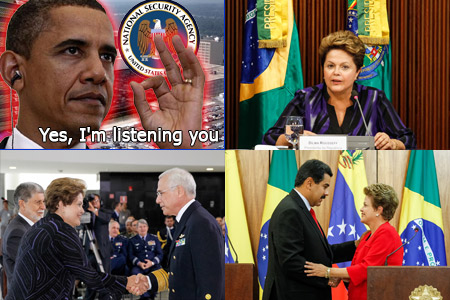skip to main |
skip to sidebar
PEACE BE UNTO ALL THE TRUTHERS,SEEK KNOWLEDGE FROM CRADLE TO GRAVE
''MAKE SURE TO ALWAYS CLICK ''OLDER POSTS''AS FRONT PAGE DOES NOT CONTAIN '' FULL CONTENTS OF DAILY POSTS AND UPDATES''
The U.S. vs. Brazil: From Espionage to Destabilization
Among the actions under consideration by the Brazilian authorities with
regard to U.S. intelligence operating on the territory of Brazil is a
tightening of control over identified American intelligence personnel
with the aim of documenting illegal aspects of their activities and
subsequently deporting them from Brazil. The Brazilian authorities are
increasingly concerned about signals that the CIA, U.S. military
intelligence, and DEA operatives are involved in the creation of "youth
protest groups" which have already been used and could be used in the
future to intensify the crisis situation in the country.
The problem of U.S. electronic espionage was discussed at the first
meeting of Mercosur leaders and experts on the problem of maintaining
computer and telecommunications security. Representatives of Brazil,
Venezuela, Bolivia, Argentina and Uruguay suggested urgent measures for
stopping "the Empire's espionage and strengthening the technological
independence and sovereignty of the bloc's participant countries."
Venezuelan Foreign Minister Elias Jaua supported Brazil in all items on
the agenda. A decision to create a workgroup for developing a unified
strategy for counteracting "imperialist interference" and "U.S. spy
operations which cause damage to governments, enterprises and citizens"
was approved. A meeting of the ministers of defense of Brazil and
Argentina was held at which the ministers signed an agreement on the
creation of a bilateral group with the aim of "attaining an optimal
level of development of cyberprotection and minimizing vulnerability to
cyberattacks".
In an interview with the Argentinian newspaper Pagina 12, Brazilian
Minister of Defense Celso Amorim told about the increasing operative
capabilities of the Center for Cybernetic Protection. The minister only
touched on the topic of the electronic spying on President Rousseff and
her entourage in passing, but he particularly emphasized that all the
facts at their disposal indicate the necessity of developing Brazil's
defensive capabilities. Celso Amorim spoke with frankness unusual for
the head of a military agency of the medium-term plans for strengthening
Brazil’s armed forces. These included the construction of a nuclear
submarine for patrolling in territorial waters and protecting oil fields
on the shelf, the development of the aerospace industry, and starting
production of the KC-390 heavy cargo aircraft, which in the future could
replace the U.S.-made Hercules in the Brazilian air force.According to data from independent sources, the scandal around the
total espionage of U.S. intelligence in Brazil could result in the
Brazil’s refusal to close a deal for the purchase of 36 F-18 Hornet
fighter planes. "We cannot," say Brazilian analysts, "sign such
large-scale contracts with a country we do not trust".
Brazil intends to follow the example of Russia and China in creating
its own Internet system, which to a significant degree will guarantee
the security of its users and hinder the illegal connection of NSA
"specialists". Among Brazil's plans is the laying of its own
communications cables to Europe and Africa. The existing communications
channels, which pass through U.S. territory, are totally monitored by
the NSA.
A delegation of Brazilian parliament members is preparing a trip to
Russia to meet with Edward Snowden and obtain additional information on
the true scale of U.S. electronic espionage in Brazil, including the use
of spy satellites. A modernized audio interception base, which was not
closed down in 2002, as the media assured everyone, is functioning at
full capacity at the U.S. embassy. It is now obvious to the Brazilian
leadership that the argument used by the U.S. administration about the
war on terrorism is only a cover for conducting operations of another
kind altogether. In the Western hemisphere, this is the infiltration of
databases and computer networks of Latin American countries, first of
all those which are trying to conduct independent policy and focusing on
integration through Unasur, ALBA, Petrocaribe, etc.It is believed that the acquisition of advance information about the
trips, routes, and places of residence of Latin American leaders
"unfriendly" to Washington - Nestor Kirchner, Inacio Lula da Silva, Hugo
Chavez and others - helped in conducting special operations against
them, some of which, as is well known, were fatal.
This year the celebration of Independence Day on September 7 in the
Brazilian capital, as well as in Rio de Janeiro, Sao Paolo and Porto
Alegre, were accompanied by well-organized mass disturbances. The
instigators pronounced anti-government slogans and shouted accusations
against Dilma Rousseff, calling her a "traitor to national interests".
Several dozen people were injured, and over 300 protesters were
detained. The police are investigating the hidden relations between the
detainees and "non-profit organizations" funded from the U.S. Some
Brazilian bloggers have interpreted these disturbances as U.S.
intelligence's "warning shot" at Dilma Rousseff.
U.S. intelligence personnel in Brazil may have to operate in much
more complex conditions in the foreseeable future. The Brazilian
intelligence agency (Abin) is now trying to rehabilitate itself in the
eyes of the president and the public. The leaders of Abin, who were
unable to detect a leak of strategically important information to the
U.S. in time, causing huge political and material losses for the
country, have received new instructions on the parameters for further
collaboration with partners from the U.S. As they say, one good turn
deserves another.




No comments:
Post a Comment